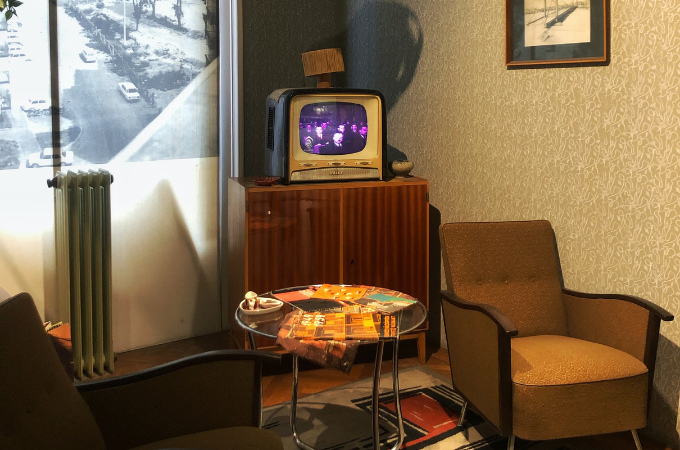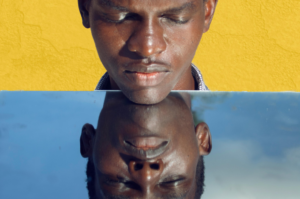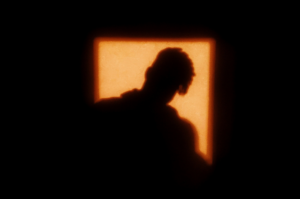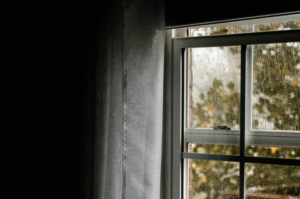
The old Reverend Father who visited our house whenever my father returned to Nigeria, used to say, “The saints are always better with the Lord.” He said this whenever there was news of a parishioner’s death, especially the devoted ones. My mother would heave a conceding sigh, and exclaim something in Igbo, along the lines of “God is God,” or “Him alone is God.” My father, more inclined to introspection than his wife, would shake his head disconsolately. He looked like if he saw the Lord face to face, he would not hesitate to question Him on many things. Each time I saw my father’s expression, the unsettled slope of his mouth, and the meditative glance in the air when Father Ikenga said this, I wanted to push him to air his grievance to the priest. Wasn’t he God’s servant? He could answer for God. I was curious to hear whatever life questions my father had, but he never asked.
Two days after the death of Honorable Aloysius Nwabara, my parents hosted Father Ikenga for dinner. Honorable Aloysius wasn’t a member of the parish, but he was the only politician in the state Father Ikenga and my father liked. He had visited our parish many times in the past, supported several projects in different parishes, and peppered all his speeches with how he was a simple boy growing up on the farm when God picked him and called on him to serve the people. A long while ago, there had been a nationwide fuel scarcity, and fuel stations were either selling at a higher price or not selling at all. However, almost all the fuel stations in the East owned by him still sold fuel, and at the normal price. My father called him different, and unalloyed. A politician of a different breed.
My parents, Father Ikenga, and many conservative Easterners were waiting for him to declare his interest in running for the position of governor by the next election. He already had their unreserved support. Didn’t he say publicly that he still prayed the rosary every night before he slept? There was a large portrait of him, his beautiful wife, and their three children hanging in my father’s conference room, a symbol of untainted public service, and recently, the State University had commissioned a building named after him. But then, life happened. We woke up that morning to hear that he had choked to death far away in the Maldives. The official news report on various TV stations stated that he suffered cardiac arrest in his hotel room after returning from a private meeting with some Nigerian youths in the diaspora. However, by evening the next day, a famous blogger reported that he had been hosting a private birthday party for his mistress, and it was while saying the toast that he choked. Just like that. A towering figure such as the Honorable, with a larger-than-life persona, choked on his own words and died.
That day, as Father Ikenga nibbled on the chicken lap Mother had placed in front of him on our ornate white saucer, I could see his lips curving eagerly to conclude the subject of Honorable Nwabara with his favorite refrain. Father was going on and on about how the state had just lost a champion, one who would have done well in state and national politics, while Mother’s face was clouded with woeful grief.
“Such a fine young man,” she muttered without noticing my father’s curious look in her direction. Somehow, reference to a dead man’s physical looks, a man whose attractiveness would no longer matter, was enough to deflect from his eulogy.
“But we must never question God. The saints are always better with the Lord,” Father Ikenga finally said. My father nodded resignedly, while my mother kept muttering “Jehova bu Eze” in feverish spurts, hugging herself tightly as though she were Nwabara’s widow.
“He was anything but a saint, though. He was hosting a private birthday party for his lover when he died.” Three pairs of perplexed adult eyes turned to me sharply, and I found that passage of scripture to be very literal. From dust we came, to dust we shall return, for in that moment, I felt the very essence of my core unhinge from the centre as if I were dissipating into specks of dust. It was as though I had just confessed to being the hands that strangled the life out of Nwabara. Who invited me to speak in the middle of an adult conversation? All I was supposed to do was stand at the doorway when we had a visitor should they need anything while they ate.
We had a house-help, but my mother prided herself in raising her child well. I was, after all, the only one. My parents made a show of revealing to everyone that, although they were well-off and had only one child, they didn’t spoil me, or allow me to be lazy, and so my customary role was to stand quietly and be on the lookout for a need before the visitor even spoke of it, and earn my mother’s delighted commendation or my father’s back pat. Unfortunately, being with adults inadvertently meant that I listened to their conversations, followed their lines of argument, picked sides mentally, and ultimately found my voice too early. But before that day, I had never interjected, never gone beyond my duty, and had only scorned or supported in my head. It was only after the visitors left that I barraged my father with questions or stated my emphatic opinions on what they had discussed. He always laughed indulgently. Then he would look at me with something of pride, a look that made my rebuttals seem more praiseworthy than impudent.
But that day, I had forgotten myself. I was a few days shy of fifteen, and perhaps the thought made me heady, and I dared to speak in the presence of Father Ikenga. Perhaps my misfortune would have been pardonable had I faltered in front of a lesser mortal, someone un-connected to divinity. And to have even uttered the word lover, not only in the presence of my parents but also in the presence of a priest. My mother would now know that I had been reading those True Love magazines her sister brought to the house which she’d asked me not to read. I waited for my judgment that day with bated breath, watching to see who the hangman would be. I looked at my father. His expression was inscrutable. Mother looked like she’d seen the ghost of Nwabara, but then, she was easy. She would pinch my ear later, twist my mouth, and tell me that it was my father’s parenting style that gave me wings.
Finally, Father Ikenga spoke. First, a smile lined his lips. “Hmm, is that so?” I refused to reply but affirmed by raising my brows and dropping them, an act made for him alone. I couldn’t afford for my parents to think I was unrepentant. He smiled again. “That’s the report from all these blogs, eh? Well, from the official news reports and from what his wife said, he died of a heart attack in his hotel room after a meeting with some Nigerian youths in the diaspora. We don’t know how these gutter bloggers come up with their scandalous reports, so we can’t judge him based on their stories. Only the Lord Almighty can speak for his soul, whether he was a saint or not.” I wanted to say that we didn’t need to wait for God because there were no official pictures of him with the Nigerian youths he met, and there was no statement from the hotel where his body was supposedly found. There was, however, a blurry picture of his silhouette and that of a young woman coming out of a casino. Even though his face was obscured, any trained eye could tell it was the Honorable. But I needed full redemption, so I kept quiet, nodding eagerly in agreement. My father seemed relieved that I did not rebut. Father Ikenga continued as if he had read my mind. “Even the picture they published, claiming it to be him, could very well be anyone else with a similar profile. That is not difficult to accomplish in this digital age, where you young people can create another human being entirely with a laptop. And even on the off chance that he was indeed the one, it doesn’t prove for a fact that the woman beside him was his lover.” My parents were nodding in agreement. They could not afford to muddle the pristine image of their hero. I held my peace and joined them in nodding rather effusively. A man pictured with his young lover leaning curiously beside him, both coming out of a casino in the Maldives, was not there to observe whether the sun set differently in the Indian Ocean than it did in Africa, but what did I know?
Father Ikenga looked at me again. “So, you follow the news, Somadina?” My father answered immediately in the affirmative, going on to tell him how we watched the news together every evening, and other commendable things I did that gave me sound exposure to the world. My father was saying a lot of things at once, for a man who was normally economical with his words. He was over-compensating for me, I knew. Father Ikenga then looked at me with impressed eyes and said something to my parents that sounded like a commendation. It was then that I knew that my penitence had been achieved.
My mother was smiling at Father Ikenga’s compliment, a generous smile that seemed to suck all the goodwill to herself, like a high-pressure suction pump, which was ironic because each time my father and I watched the news, she would walk back and forth in the sitting room, reminding me that it was getting late and that following up with a series of negative news on TV was a bad habit reserved only for men. Women didn’t stay up past 10 pm watching gory sights on TV and discussing negative global events, even if their discussion partner was their father. It would make me a bitter and critical woman as I grew older, and I’d grow to be paranoid. So, when I saw her smiling and looking satisfied, I was amused. She was thanking Father Ikenga for his compliment, saying it was not easy. People used to mock her years ago for giving her husband only one child, but today, God was giving her the grace to raise that one well. She began to wave her hands in the air, an Igbo song rising from her throat, each flailing of her arms fractioning her voice. I loved her, this woman I called my mother. We had an odd relationship in which she was constantly bemoaning my mischief in private while praising me in public. I teased her with some things I did because I knew she would resort to melodrama when scolding me, and there was an odd pleasure in watching my mother’s exaggerated reactions to both the good and the bad, just as she was turning a simple compliment into a worship session.
Somehow, that day, my parents and Father Ikenga ended up saying a prayer for the departed soul of the Honorable, a prayer I didn’t believe God would answer. And Father Ikenga still called him a saint while he prayed. That night, as I lay in my bed to sleep, I dreamt of the Honorable. In my dream, he was walking to what seemed like the gates of heaven, a glass of red wine in his hands. Suddenly, three towering creatures draped in blinding lights appeared and began to howl at him, calling him a sinner and refusing him entry. He was struggling with them when a thicker voice roared from a haloed distance, rebuked the lighted creatures, and beckoned him to come toward the direction of the burning halo. The towering figures released their hold on the Honorable reluctantly, and he, with a self-satisfied smirk on his face, picked up his glass that had fallen out of his hand during the tussle, its content emptied, and began swaggering towards the direction of the voice. And then a strange thing happened. As he got closer, his neck began to wring, a slow movement that made it long and grotesque. The Honorable began to scream, his hands struggling to restrain his neck. He seemed to be in terrible pain. When the pain became unbearable, he fell to his feet, twisting and turning in spasm-like agitated motions. His neck continued to twist around itself, as though a curling vibration had been ignited inside his throat, and each curl made it longer than its normal length. The Honorable’s head was soon up to six inches away from his body, which lay on the floor, writhing in pain. Then there was a snapping sound, and the neck was no more. In fact, his entire body was no more. It had puffed into nothingness.
I woke up from that dream, oddly calm. I sat up in my bed for a few minutes, reliving the bizarre images that woke me. I imagined the frustrated look that would be on my mother’s face if I told her of my stupid dream and how I had contended so much with the thought of the Honorable the night before that I slept and had a dream of him choking to death even at the gates of heaven. The next day, as I helped my mother peel off the green leafy husks of the corn she planned to boil, I said simply, “Honorable Nwabara is not in heaven. I think God believes the blogger over TCN.” She gave me a look, the wearied look of a mother who could not use a knife to cut off her own child’s mouth but would have loved to try.










Chidinma April 08, 2023 07:03
I loved reading this story. Super well done, Chinelo!